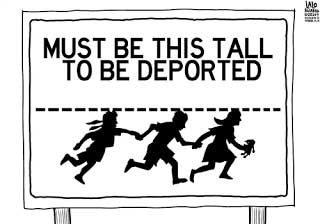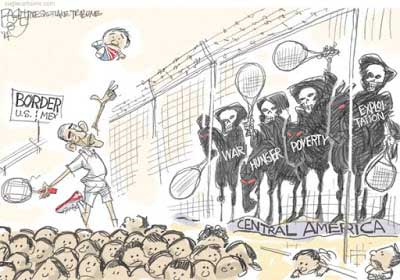I met Paul Zoltan, immigration lawyer and human being extraordinaire, when I wanted to work a little closer to home helping refugees. Although going to South Texas to help the mothers and children crossing the border is extremely rewarding — and I know it helped both refugees and Sacred Heart Respite Center, which continues to do great work — I needed a place where I could volunteer my time and services closer to home.

Paul Zoltan has mounted an incredible operation, together with Catholic Charities of Dallas.
But as all operations go, he needs much help.
If you are a lawyer, a writer, a translator, a teacher, a good samaritan — and you can offer your assistance — please contact me to help out at the next pro se asylum clinic in February at Catholic Charities of Dallas. We hold these immigration clinics every two months now, so we are in constant need of volunteers!
In the meantime, I will leave you with a great editorial Paul wrote in reaction to the mass raids that have started to take place this new year, just in time to show our “welcoming spirit and solidarity to immigrants,” just like our forebears were shown…
Maybe with Paul’s words, you can imagine what you can become a part of, and you can then see how much these women and children fleeing for their lives really need of our help.

It alarmed me to read in the Dallas Morning News that the Department of Homeland Security (DHS) plans in the coming months to deport hundreds of the families who have recently sought refuge from the violence in their Central American homelands. Though DHS officials say that they will take “only adults and children who have already been ordered removed from the United States by an immigration judge,” I don’t believe this. It is far likelier that many of these families have been subject to the “expedited removal” process and, more troubling still, that many of these were denied access to a judge in violation of the law.
Under U.S. immigration law, most immigrants who cross a U.S. border without proper documents are subject to expedited removal, in which judges play no part. This includes recent arrivals from Central America. A mother with her children (there are very, very few fathers among them) gets to see a judge only if a DHS asylum officer determines that she has a credible fear of persecution. And before she gets to see that officer, she must first tell a DHS agent that she is afraid of returning to her homeland. More precisely, she gets to see the asylum officer only if a DHS agent hears her say, “Tengo miedo” (“I’m afraid”).

But Customs and Border Protection (CBP) has a hearing problem.
According to its own statistics, CBP allows alarmingly few Central American refugees to see the asylum officer who might open the courtroom door. In recent years, just 5.5 percent of the Salvadorans CBP arrests are allowed this “credible fear” interview. For Hondurans and Guatemalans, the numbers are lower still: 1.9 and 0.8 percent respectively.
It is inconceivable that fewer than one in 50 Honduran migrants expresses any fear of returning to a country that is the most violent in this hemisphere, with a murder rate 20 times greater than that of the U.S. The organization Human Rights Watch therefore concluded, in a report entitled “You Don’t Have Rights Here,” that many CBP agents must be plugging their ears.
I am certain that they are.
For the past 15 months, I have harnessed 23 years’ experience practicing immigration law to work as a volunteer with an asylum clinic at Catholic Charities Immigration and Legal Services. There, and in my own office, I have interviewed over 200 children and families who fled Central America in the past two years. Among them were several who had expressed to CBP agents their fear of returning and were nevertheless subject to expedited removal orders without having spoken to an asylum officer (let alone a judge). This injustice would have gone unnoticed had they not been released pending their removal.
In each of these cases where CBP ignored a mother’s expression of fear, it was not too late: when told of the violations, the Dallas DHS Office of Chief Counsel swiftly alerted the DHS asylum office.
To avert tragedy, this must now be done on a national level.
DHS must ensure that, among the “hundreds” of families it plans to arrest and deport in coming months, none have been illegally deprived their chance to ask a judge for asylum.
On January 7, 2016 in the Dallas Morning News Opinion, this piece was published as “Paul Zoltan: U.S. must ensure due process before deporting refugees of Central American violence”

“Know Your Rights” Immigration Presentation
ABOUT PAUL ZOLTAN
In 1992, upon receiving his Juris Doctor degree from the University of Minnesota, Paul Zoltan determined to devote his legal practice solely to immigration. In a way, the choice was made for him: as the son of a Hungarian refugee, he felt compelled to work so that the refugees and immigrants of today were welcomed as his father was, over four decades ago.
Paul Steven Zoltan has practiced exclusively immigration law since 1992. One of the founders of Dallas’ Child Refugee Support Network, he trains and supervises volunteers for Dallas Catholic Charities’ pro se asylum clinic. He has served as liaison between the Houston Asylum Office and the Texoma Chapter of the American Immigration Lawyers Association (AILA), and has presented at numerous regional and national AILA conferences.
He has chaired the District 6A Grievance Committee for the Texas Bar, as well as the boards of directors of Proyecto Adelante and the Center for Survivors of Torture. Mr. Zoltan served on the advisory board of the Dallas office of the International Rescue Committee and, for over a decade, coordinated the Dallas Section of AILA. He has taught both Immigration Law and Legal Writing and Reasoning at the University of Texas at Dallas. In 2012, the Super Lawyers rating service named Mr. Zoltan a Rising Star.
Leave a Reply